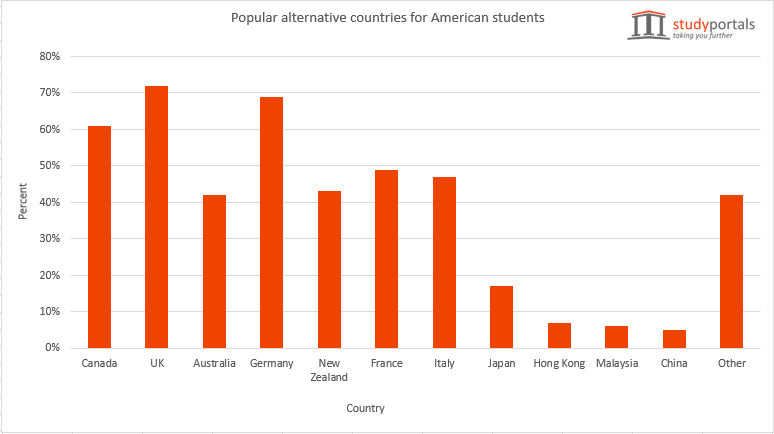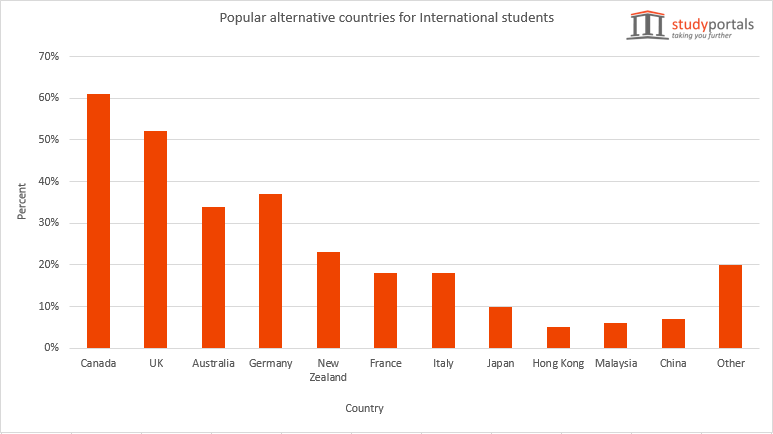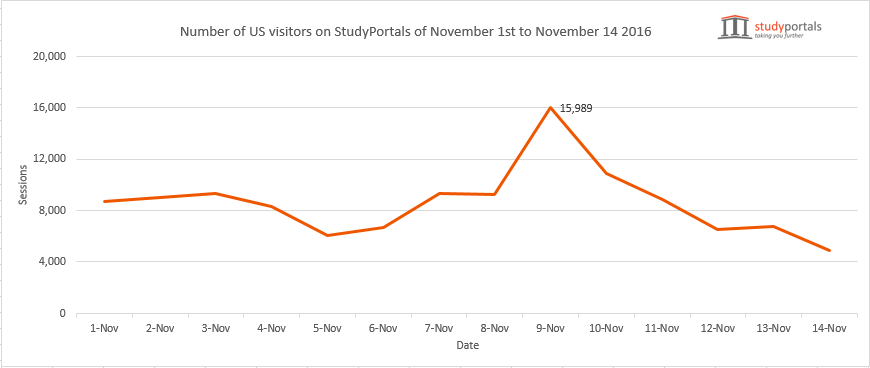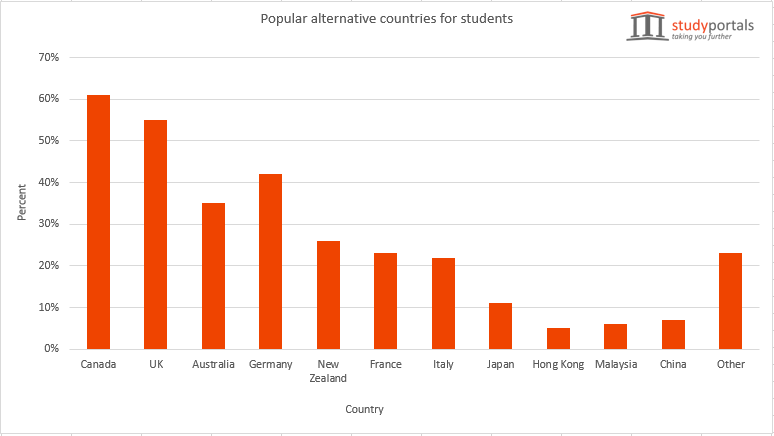The US Election and International Education: What do Students Think?
The results of the 2016 US elections come as a surprise to many. One question on everyone’s minds is: what implications will his presidency have for international education, and US education in general? We conducted a survey of over 1,300 international and American students in order to gauge students’ main thoughts and sentiments after the election.
What changes in traffic did we see on our website?
At Studyportals, our academic portals first revealed the impact of the election. On November 9 (the day Mr Trump won the elections) we noticed an almost 75% increase of American visitors to our portals. American students were predominantly exploring foreign study options in Canada, United Kingdom and Germany. Popular pages US students visited included:
- The Easy Guide to a Student Visa for Canada
- 30 Social Work Master’s degrees in Canada
- 5 Data Science & Big Data Master’s degrees in Canada
- 39 Public Health Master’s degrees in Canada
- 63 Scholarships in United Kingdom
- 11 Library Science Master’s degrees in United Kingdom
- Study Public Administration In United Kingdom
- Tuition Free Universities in Finland, Norway and Germany in 2016
- 49 Top Universities In Germany – Global Rankings
- 26 Mechanical Engineering Master’s degrees in Germany
Mr. Trump as president: how do students feel?
Over 75% of students mentioned that they are considering studying in the US. However, more than half the students said, with Mr Trump being the newly elected president, they are far less likely to study in the US now, compared to before the elections. The main reasons students grew less inclined to consider US study options included:
- Over 80% of all students feel that the US is becoming less welcoming towards international students and minorities;
- Students think the US will become weaker with Mr Trump as president;
- Students say that their view of Americans has worsened as a result of the elections.
It is interesting to note is that the most popular alternative study locations are, predominantly, other Anglophone countries such as Canada(61%), United Kingdom(55%), Australia(35%). Furthermore, Germany(42%), France(23%) and Italy(22%) are also popular alternatives for American students.
Among students who are more likely to study in the US, now that Mr Trump is elected president, their main motivations come from the following beliefs:
- Mr Trump will make the US a stronger country;
- The US will be more welcoming to international students;
- Mr Trump will be able to offer better employment opportunities and high-quality education.
The main concerns on students’ minds relate to visa potential and immigration policies. However, most students have confidence in the quality of the American education and degrees; and therefore, don’t foresee its value decreasing in the foreseeable future.
“As Trump has promised to Americans that they would be always prior in each field then I think the laws towards getting visa for study purpose or for other means is going to be more strict.”
American students: even more negative about studying in the US
American students’ views on Mr Trump’s presidency appear to be more negative compared to international students. 85% of all American survey respondents indicated that they are now less likely to study in the US (whereas, for international students, this number is smaller: 57 %). Research done by The PIE News showed that Mrs Clinton was strongly preferred among highly educated young adults in the US, so students are still adjusting to the results of the elections. American students are particularly concerned that the US will become weaker with Mr Trump as president, and they are worried that the US will be less welcoming towards international students and minorities on campus. This result also tells us that US students place a high value on studying in international and diverse classrooms.
Most American students are primarily considering alternative study options in the United Kingdom(72%), Germany(69%), or Canada(60%) among other European countries, such as France(49%%) or Italy(47%), followed by more distant locations such as Australia(42%) or New Zealand(43%).
15% of the US respondents indicated that they are now more likely to study in the United States, mainly because they believe there will be better employment prospects in the future.
International students: less likely to come to the US to study now
57% of all international respondents demonstrated a decreased likelihood of studying in the US after Trump won the elections. Similar to American students, popular alternative destinations include Canada(61%), United Kingdom(52%), Australia(34%), Germany(37%) but also New Zealand(23%), France(18%) and Italy(18%). A staggering 87% of all international students indicated that, the main reason their decreased desire to study in the US is that they perceive the US to be less welcoming towards international students. Also, their view of Americans has worsened as a result of the elections.
Among those students to whom the US has become more appealing, some are more drawn to studying there because they believe that the quality of research and education will continue to improve in the coming years and because they also think the US will be stronger with Mr Trump. In addition, many expect a decrease in education costs now that Mr Trump is elected president, based on previous campaign promises.
What’s next for American universities?
According to students, what should American universities do?
We asked students how they think American universities should react to Mr Trump being president. We received many valuable responses, and students seem to be quite equal in their suggestions.
- Students think that universities should accept the fact that Mr Trump will be the next president, and continue focusing on what is really important for their students;
- Students want American universities to keep focusing on providing high-quality education, rather than be too involved in politics;
- Students mention the importance of diversity on university campuses, and therefore also demand the universities continue to protect minority groups and promote diversity to keep a safe, open and non-discriminatory environment for all students.
“They should maintain the standards, policies and quality of education that earned them their reputation in the first place. They should definitely be more welcoming and kind to international students as well as minorities. They should make an effort to make their campuses safer for minorities as well. Make a strong point on scientific findings and in contributing to the political and societal discourse. – Promote diversity, freedom of speech, equality at the university.”
“Avoid political concerns and focus on education and creating peaceful loving communities. Mr. Trump could actually do better or worse, but that is unknown. Focus on the known facts and main purposes of the educational facilities.”
“American universities should remain relatively neutral so as to not create (more) tension among students.”
“Push to make their campuses a safe haven for immigrants, minorities, and women. Develop absolute zero tolerance policies for behaviors and displays that are threatening, discriminatory, and hostile. Have leaders that are not afraid to speak out against intolerance.”
According to students, what are the biggest changes in the educational field?
We also asked what students think will be the biggest changes in the educational field under the new administration, and the predominant answer relates to an increase in tuition fees and a decrease in the internationalization within the student body. Due to the increased tuition fees, many students fear that education will become inaccessible to more vulnerable groups within society and some believe that only the wealthy students will be able to enjoy a high-quality education.
For more updates, follow us!“Reduced diversity from international students. Tuition rates will continue to rise.”
“We will lose teachers and funding opportunities for low income students to go to college. Larger class sizes are expected.”
“Less funding for grants, fewer scholarships, particularly for minorities, the economically challenged and international students.”
“I’m worried about the effect his presidency will have on science/medical education, funding, and forward progress.”







